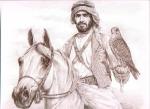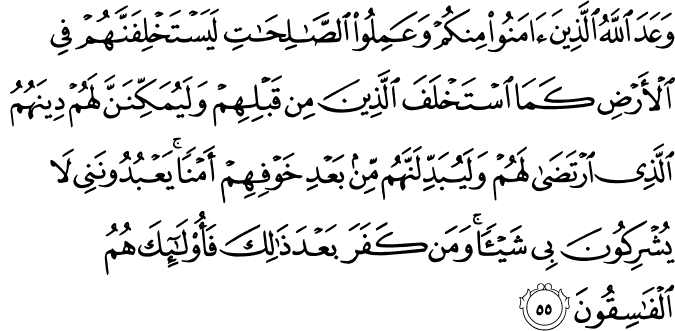Example: Bani Al-Mustaliq (Muraisi‘) Ghazwah, Sha‘ban 6 Hijri
Though militarily it did not assume its full dimension, this Ghazwah had certain implications that brought about a state of turbulence within the Islamic State, and resulted in disgracefulness to clothe in the hypocrites. Moreover, it entailed enactment of consolidating legislations that attached an impression of nobility, dignity and purity of souls to the Islamic community.
News reached the Prophet [pbuh] on Sha‘ban 2nd. to the effect that the chief of Bani Al-Mustaliq, Al-Harith bin Dirar had mobilised his men, along with some Arabs, to attack Madinah. Buraidah bin Al-Haseeb Al-Aslami was immediately despatched to verify the reports. He had some words with Abi Dirar, who confirmed his intention of war. He later sent a reconnoiterer to explore the positions of the Muslims but he was captured and killed. The Prophet [pbuh] summoned his men and ordered them to prepare for war. Before leaving, Zaid bin Haritha was mandated to see to the affairs of Madinah and dispose them. On hearing the advent of the Muslims, the disbelievers got frightened and the Arabs going with them defected and ran away to their lives. Abu Bakr was entrusted with the banner of the Emigrants, and that of the Helpers went to Sa‘d bin ‘Ubada. The two armies were stationed at a well called Muraisi. Arrow shooting went on for an hour, and then the Muslims rushed and engaged with the enemy in a battle that ended in full victory for the Muslims. Some men were killed, women and children of the disbelievers taken as captives, and a lot of booty fell to the lot of the Muslims. Only one Muslim was killed by mistake by a Helper. Amongst the captives was Juwairiyah, daughter of Al-Harith, chief of the disbelievers. The Prophet [pbuh] married her and, in compensation, the Muslims had to manumit a hundred others of the enemy prisoners who embraced Islam, and were then called the Prophet’s in-laws. [Za'd Al-Ma'ad 2/112,113; Ibn Hisham 2/289,290,294,295]
The Treacherous Role of the Hypocrites prior to the Bani Al-Mustaliq Ghazwah
‘Abdullah bin Ubai, a terrible hypocrite was full of rancour against Islam and the Muslims because he believed that the Prophet [pbuh] had dispossessed him of his leadership over Al-Aws and Al-Khazraj, two clans already agreed on the Prophethood of Muhammad [pbuh] and his masterhood over them.
‘Abdullah’s rancour had appeared before he feigned Islam. Following the battle of Badr, he made pretensions of being a Muslim, but deep at heart, he remained that terrible enemy of Allah, His Messenger; and all the believers, in general. His sole target had always been to sow the seeds of dissension in the Muslim community, and undermine the cause of the new heavenly religion it has. His treacherous behaviour could be witnessed everywhere but was strikingly evident in his wicked attempts at creating a state of confusion and disorder amongst the Muslims at Uhud Battle. His hypocrisy and deceit assumed serious and ugly dimensions when he used to stand up among the Muslims shortly before the Prophet’s Friday speech, and mockingly say to them: "This is the Messenger of Allah, who has honoured you with Allah, so you have got to support, obey and listen to him," and then he would sit down.
He did the same following Uhud Battle on Friday. He was so rude and presumptuous that his words smacked unmistakingly of deeply-rooted rancour, so that some of the Muslims took him by his cloak reproachingly and silenced him. He immediately left, uttering rude and mocking words. A Helper met him at the Mosque gate and ordered him to return and beg the Messenger for Allah’s forgiveness, but he retorted that he had never wanted him to ask for that.[Ibn Hisham 2/105] He, moreover, conducted clandestine contacts with Bani Nadir, another tribe of Jews, encouraging them to make alliance with him and promising support for them; all of this in his ceaseless efforts in a long process of conspiracy and intrigue hatched against the Muslims. Allah’s Words as regards his treacherous acts and awe-inspiring attempts during the Trench Battle came to testify quite clearly to this mode of hypocrisy:

"And when the hypocrites and those in whose hearts is a disease (of doubts) said: ‘Allah and His Messenger ([pbuh]) promised us nothing but delusions!" [Al-Qur'an 33:12]
The verses go on in the same context to describe the hypocrite as a coward and a defeatist. He is a liar and has no regard for pledges solemnly made. He is treacherous, disloyal and perfidious. He is niggardly and greedy. In short, he is the complete antithesis of a true believer:

"They think that Al-Ahzab (the Confederates) have not yet withdrawn, and if Al-Ahzab (the Confederates) should come (again), they would wish they were in the deserts (wandering) among the bedouins, seeking news about you (from a far place); and if they (happen) to be among you, they would not fight but little." [Al-Qur'an 33:20]
All enemies of Islam from the Jews, hypocrites and polytheists did acknowledge that Islam had the upper hand not because of material superiority, multitudes of troops or much equipment; but it was rather due to the noble values, refined ethics and high attributes that imbued the Muslim community and whoever was attached to it. The enemies of Islam were already aware of that flood of light derived wholly from the person of the Prophet [pbuh] , who always stood as an excellent exemplar for men to copy and follow.
The enemies of Islam, after steering the course of futile warfare against the new religion for five years, came to realize fully that exterminating Islam is not accessible in the battlefields, so they resorted to other tactics. They, being reputed gossip-mongers, decided to launch a widespread propaganda campaign aiming at slandering the person of the Prophet [pbuh] in a most sensitive area of the Arabian life, namely ethics and traditions. Following the battle of the Confederates, the Prophet [pbuh] married Zainab bint Jahsh after her marriage with Zaid bin Haritha, his adopted son, had broken up. They seized this opportunity and began to circulate idle talk against the Prophet [pbuh] in Arabia depending on a tradition among the desert Arabs that prohibits contracting a marriage with an adopted son’s divorcee. They alleged that his marriage would be considered a heinous sin. They also based their malicious propaganda on the fact that Zainab was his fifth wife whereas the number was strictly limited to a maximum of four in the Noble Qur’�n, hence the validity of this marriage was in doubt, according to them.
These rumours and gossips had a negative impact on the morale of some weak-hearted Muslims until the decisive verses were revealed acquitting the Prophet [pbuh] and invalidating all those ill designs and obnoxious schemes:

"O Prophet (Muhammad [pbuh])! Keep your duty to Allah, and obey not the disbelievers and the hypocrites (i.e. do not follow their advices). Verily! Allah is Ever All-Knower, All-Wise." [Al-Qur'an 33:1]
The wicked Role they played in the course of the Ghazwah of Bani Al-Mustaliq
During this Ghazwah, the hypocrites almost managed to create a sort of discord among the Muslims themselves, coupled with a serious and ugly slander against the Prophet [pbuh] himself. In short, their behaviour was an authentic translation of Allah’s Words:

"Had they marched out with you, they would have added to you nothing except disorder, and they would have hurried about in your midst (spreading corruption) and sowing sedition among you …" [Al-Qur'an 9:47]
A quarrel was about to break out between the Emigrants and the Helpers on account of plots and evil intentions designed by the hypocrites. The Prophet [pbuh] told them off describing their misbehaviour as something smacking of pre-Islamic practices. They, hypocrites with ‘Abdullah bin ‘Ubai at their head, were furious for the challenge which the Muslims showed towards the hostile plans and vicious intrigues woven behind closed doors, and swore "the most honourable will expel the meanest out of Madinah," and added: "They (the Muslims) have outnumbered and shared us our land. If you fatten your dog, it will eat you." When that talk was reported to the Prophet [pbuh], ‘Umar, a venerable Companion, asked for permission to have Ibn ‘Ubai killed. The Prophet [pbuh] naturally turned down his proposal on the grounds that it did not become of a Prophet [pbuh] to be accused of killing his people. He, on the contrary in an unexpected move, asked ‘Umar to announce departure. He marched with his men for two days until the sun grew too hot. They stopped and fell asleep, a clever attempt at diverting his people’s attention from the previous event. ‘Abdullah’s son heard of that vile of his father and as the party reached Madinah, he drew his sword and barred his father’s entry into the town until he had confessed and declared that he himself was the meanest of the citizens of Madinah and the Prophet [pbuh] the most honourable of them. Thus the boast recoiled on his head. It was also reported that the son was ready to kill his father if the Prophet [pbuh] had wanted him to.
The Slander Affair
This extremely painful incident took place on the Prophet’s return from the expedition against Bani Mustaliq. The Muslim army had to halt for a night at a place, a short distance from Madinah. In this expedition, the Prophet [pbuh] was accompanied by his noble and talented wife, ‘Aishah [R]. As it so happened, ‘Aishah [R] went out some distance from the camp to attend to the call of nature. When she returned, she discovered that she had dropped her necklace somewhere. The necklace itself was of no great value, but as it was a loan from a friend, ‘Aishah [R] went out again to search for it. On her return, to her great grief and mortification, the army had already marched away with the camel she was riding, her attendants thinking that she was in the litter as she was then thin, very young and light of weight. In her helplessness she sat down and cried till sleep overpowered her. Safwan bin Mu‘attal, an Emigrant, who was coming in the rear recognized her as he had seen her before the verse enjoining the veil was revealed, and brought her on his camel to Madinah without saying a single word to her, himself walking behind the animal. The hypocrites of Madinah led by ‘Abdullah bin ‘Ubai bin Salul, sought to make capital out of this incident and spread a malicious scandal against ‘Aishah [R] and unfortunately some of the Muslims also became involved in it. On arrival in Madinah, the Prophet [pbuh] held counsel with his Companions, who pronounced different opinions ranging from divorce to retention. The incident almost roused a fight between two rival factions, Al-Aws and Al-Khazraj, but the Prophet’s intervention silenced both parties on the sport. ‘Aishah [R], unaware of the rumours being circulated, fell ill and was confined to bed for a month. On recovering, she heard of the slander and took permission to go and see her parents seeking authentic news. She then burst into tears and stayed for two days and one sleepless night ceaselessly weeping to such an extent that she felt her liver was about to rip open. The Prophet [pbuh] visited her in that situation, and after testifying to the Oneness of Allah he told her, "If you are innocent, Allah will acquit you, otherwise, you have to beg for His forgiveness and pardon." She stopped weeping and asked her parents to speak for her, but they had nothing to say, so she herself took the initiative and said "Should I tell you I am innocent, and Allah knows that I am surely innocent, you will not believe me; and if I were to admit something of which, Allah knows, I am innocent, you will believe me, then I will have nothing to make recourse to except the words of the father of Prophet Yusuf (Joseph):
فَصَبْرٌ جَمِيلٌ ۖ وَاللَّهُ الْمُسْتَعَانُ عَلَىٰ مَا تَصِفُونَ
"So (for me) patience is most fitting. And it is Allah (Alone) Whose Help can be sought against that which you assert." [Al-Qur'an 12:18]
She then turned away and lay down for some rest. At that decisive moment the Revelation came acquitting ‘Aishah [R] of all the slanderous talk fabricated in this concern. ‘Aishah [R], of course, was wholeheartedly joyful and praised Allah thankfully. Allah’s Words in this regard went as follows:

"Verily! Those who brought forth the slander (against ‘Aishah [R] — the wife of the Prophet [pbuh]) are a group among you." [Al-Qur'an 24:11]
The principal elements involved in the slander affair, Mistah bin Athatha, Hassan bin Thabit and Hamnah bint Jahsh, were flogged with eighty stripes.
As for the man who took the principal part, ‘Abdullah bin Ubai, he was not flogged, either because the corporal punishment commutes the chastisement in store for him in the Hereafter, and he does not deserve this merit, or for the same public interest for which he was not killed previously. He, moreover, became the butt of reproach and humiliation amongst his people after his real intentions had been unequivocally exposed to all the public. [Sahih Al-Bukhari 1/364,2/696-698; Za'd Al-Ma'ad 2/113-115; Ibn Hisham 2/297-307]
Almost a month later, the Messenger of Allah

and ‘Umar bin Al-Khattab were engaged in the following talk: "Don’t you see ‘Umar if I had had him (Abdullah bin Ubai) killed, a large number of dignitaries would have furiously hastened to fight for him. Now, on the contrary, if I ask them to kill him, they will do so out of their own free will." ‘Umar replied "I swear by Allah that the Prophet’s judgement is much more sound than mine." [Ibn Hisham 2/293]








 Reply With Quote
Reply With Quote



















 and ‘Umar bin Al-Khattab were engaged in the following talk: "Don’t you see ‘Umar if I had had him (Abdullah bin Ubai) killed, a large number of dignitaries would have furiously hastened to fight for him. Now, on the contrary, if I ask them to kill him, they will do so out of their own free will." ‘Umar replied "I swear by Allah that the Prophet’s judgement is much more sound than mine." [Ibn Hisham 2/293]
and ‘Umar bin Al-Khattab were engaged in the following talk: "Don’t you see ‘Umar if I had had him (Abdullah bin Ubai) killed, a large number of dignitaries would have furiously hastened to fight for him. Now, on the contrary, if I ask them to kill him, they will do so out of their own free will." ‘Umar replied "I swear by Allah that the Prophet’s judgement is much more sound than mine." [Ibn Hisham 2/293]


Bookmarks